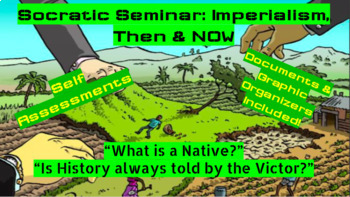Socratic Seminar: European Imperialism Then & Now 2 Day Critical Thinking Lesson
- PDF
Description
Time: 2 Days
This lesson is observation tested, and approved! Personally, Socratic Seminars are one of my favorite lessons to conduct, however, I am also aware of the uneasiness that comes along with releasing the control of the classroom to your students. On the other hand, from my experience, students love taking on the leadership role, and are constantly evolving in their critical thinking skills when given the opportunity!
Imperialism is one of the largest units for students in the global 2r curriculum, making it that much more challenging. Because of this, I find that traditional assessments often fail to evaluate students' true depth of knowledge.
This two day lesson allows students to explore the reach of imperialism, using their knowledge of social studies, as well as key academic skills used in all classroom settings. By bridging the gap between past and present European colonization, students become the creators and answer the ever important question "Why do kids need to learn social studies?" Beginning with students investigating the evolution of European Imperialism in China, Africa, India, and Japan, students will make the higher order thinking connections through collaboration, in order to question how the past has shaped modern day society and it's flaws.
For any new Socratic Seminar facilitators, do not fear! This lesson is guided through step by step procedures, Next Generation standards, rationales, and guided questions to make the seminar one to remember! For students, it features eight documents comparing the Age of Imperialism to the modern day, introduction pages to seminars, as well as self assessments, and active speaker and listeners guides.
This Lesson Includes
- Backwards Design Lesson Plan with included Next Generation Standards, New Framework Social Studies Standards, and rationales that plug into the lesson
- Guided Questions
- Separate Lists of what skills, facts, and understandings students will acquire
- Separate Lists of Authentic and Summative Assessments conducted throughout
- Developmental Procedures for two days with included AIM's & measurable objectives
- Differentiated Procedures bolded within the plan to meet diverse learners needs
- Seminar Guidelines
- Eight Documents Comparing European Imperialism in Asia, Africa, and the America's to modern day Enduring Issues
- Active Speakers Guide/Accountable Talk Rubric
- Active Listeners Rubric
- Self Assessment
- Exit Activity





